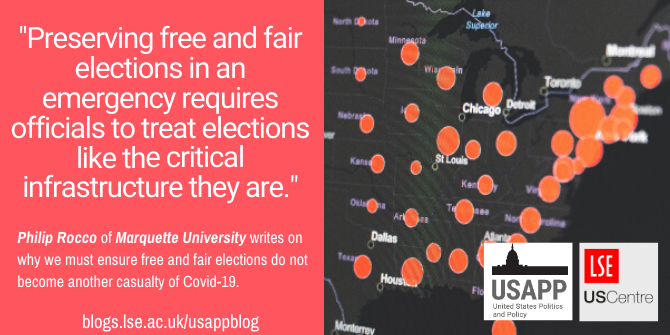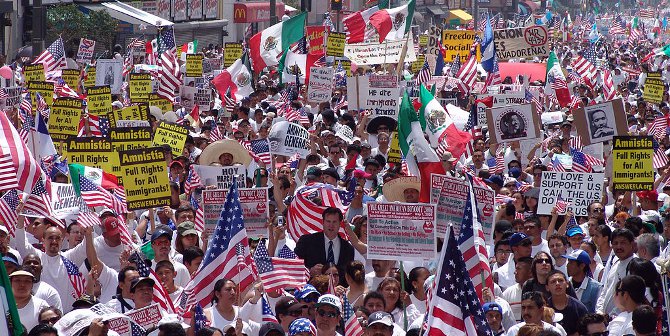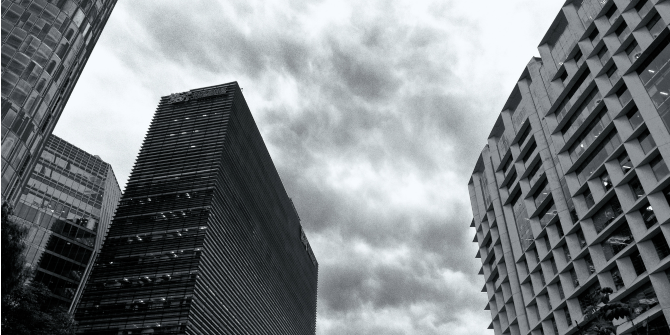 With the outbreak of Covid-19, much of the nation’s infrastructure is being tested as never before, including its electoral institutions. Philip Rocco writes that decisions now being taken by public officials about primary elections now, and the general in November, need to take into account of both how the pandemic may make it harder for some at-risk populations to vote, and how delaying votes can create new barriers to participation.
With the outbreak of Covid-19, much of the nation’s infrastructure is being tested as never before, including its electoral institutions. Philip Rocco writes that decisions now being taken by public officials about primary elections now, and the general in November, need to take into account of both how the pandemic may make it harder for some at-risk populations to vote, and how delaying votes can create new barriers to participation.
Be it a bridge, a telephone network, or a public-health system, infrastructure becomes readily visible only when it fails. And when the failure of key infrastructure causes major social and economic dislocations, as in the case of the Covid-19 pandemic, the public is introduced to a parade of new unknowns. Which infrastructure will fail next? How long before there are no more Intensive Care Unit beds or ventilators? And how long will it take government to step in to mitigate the worst economic effects of the crisis on workers?
On Tuesday this week, Covid-19 made another infrastructure visible: the US’s uneven, brittle, and taken-for-granted institutions for election administration. Amid emergency declarations and quarantine rules, three states (Arizona, Florida, and Illinois) held primary elections. Another state, Ohio, postponed its elections until June, following the decisions of several others. States’ decisions to hold or to postpone scheduled elections have become the subject of intense controversy. While the pandemic did not appear to depress turnout in Arizona or Florida, states’ decisions to hold these elections as normal faced major criticism for increasing voters’ chances of exposure to the virus, especially given long lines in some precincts. In Illinois, by contrast, turnout was down by as many as five-hundred thousand votes compared to 2016. The Chicago Board of Election Commissioners requested that the governor postpone the election, especially given a shortage of poll workers led to noticeable barriers to ballot access.
In Ohio, a different debate has played out. In response to pressure, the state’s governor, Mike DeWine, announced that he could not unilaterally delay the primaries. Voters sued in state court for a temporary restraining order to prevent in-person voting, but the court denied the motion. After the Ohio Department of Health stepped in, issuing an order closing all polling places, the Secretary of State rescheduled in-person voting to June. This move drew criticism for coming only hours before the election and spreading widespread confusion among voters.
How do we preserve democracy in times of emergency?
To date, more than a dozen states have made changes to primary elections, caucuses, or conventions. As the virus progresses, we’re likely to see more, especially if quarantines remain in place as rescheduled elections grow near. And as the general election approaches in November, states’ responses to coronavirus will invite fears about how to preserve the continuity of democracy in an emergency.
These fears are not new. At the dawn of the atomic age, political scientists like Clinton Rossiter expressed the concern that democracies would enter a state of “chronic emergency,” with greater powers ceded to the executive branch to disrupt the normal functioning of liberal rights and democratic participation. Yet, as Tuesday’s elections remind us, emergency rule is not merely a function of the national executive, it is embedded within the statute books of the states—where the authority over election administration is lodged.

Photo by Martin Sanchez on Unsplash.
Public health emergencies sit uncomfortably with international standards for election administration as well as street-level operational routines. When a pandemic occurs, health risks are not distributed evenly throughout the population. Holding an election under these conditions means that the costs of voting increase disproportionately for at-risk populations, violating the principle of universal suffrage. It may also diminish the basic material conditions for a free and fair election—such as adequately staffed polling places. Of course, delaying an election and altering already arcane voting procedures in the face of a pandemic can also increase the cost of voting. Because the routine timing and scheduling of elections is an essential feature of democracy, delays raise concerns about the legitimacy of institutions.
Especially given the weakening of trust in government at all levels, the success (or failure) of emergency election management has ramifications beyond the election-day procedures themselves. How officials act—and they explain their actions to the public—will be critical in preserving the legitimacy of American democracy in a time of vulnerabilities.
We need to treat elections like the critical infrastructure they are
The current framing of the debate does not help and may ultimately prevent us from solving the problem. During an emergency, both officials and the public may be inclined to search for a single, clear policy fix. Yet the search is illusory. The choice that elected officials face in an emergency is not whether to delay or proceed with an election. Nor is it merely whether to universalize voting by mail. Rather, both measures are potential means to two equally important ends that sit in tension with one another: protecting public health and preserving free and fair elections. Delays may help to mitigate immediate health risks, but they may also create new barriers to access.
Preserving free and fair elections in an emergency requires officials to treat elections like the critical infrastructure they are. Through their emergency powers, governors, election officials, and public-health leaders will play an especially important role in setting the tone and coordinating operations here. Borrowing from the standard three-part public-health framework, they must first assess the barriers to voting during an emergency, then use evidence to adopt a variety of policies that will minimize those barriers, and finally engage in assurance, ensuring that all necessary means are available to hold the election. Indeed, the guidelines for emergency management of elections developed by the National Association of Secretaries of State and the US Election Assistance Commission recommend that states pursue a variety of options to preserve ballot access while protecting public health. We can also take lessons from the way elections were managed following Hurricane Sandy in 2012. In New Jersey, the state pursued a comprehensive approach to emergency election management, which included daily statewide calls in the week leading up to Election Day, as well as a strategy for minimizing barriers to the ballot box and expanding early in-person, mobile, and provisional voting.
This example points to the most important challenge states will face in the days and weeks ahead. The infrastructure of US election administration is already highly uneven, poorly funded, and administratively burdensome for voters. A combination of red tape and inadequate resources all work to depress turnout under the best of circumstances. And, as the Iowa Caucuses showed, when public officials fail to plan system redundancies, the likelihood of significant errors increases. As we ask state and local officials to use invoke emergency authority to protect their residents’ public health and their economic survival, we must also demand that Congress recognize the risks to democratic rule. As the Brennan Center for Justice notes, this will require both appropriating needed resources to support expanded emergency election operations as well as re-considering Electoral College deadlines. Yet regardless of the specific mix of actions taken by any level of government, officials must apply a crisis management lens to the protection of free and fair elections. The right to vote is as precious a resource as any we have—and just as vulnerable.
Please read our comments policy before commenting.
Note: This article gives the views of the author, and not the position of USAPP – American Politics and Policy, nor the London School of Economics.
Shortened URL for this post: http://bit.ly/3agNDbC
About the author
 Philip Rocco – Marquette University
Philip Rocco – Marquette University
Philip Rocco (@philiprocco) is an assistant professor in the Department of Political Science at Marquette University. He is the co-author of Obamacare Wars: Federalism, State Politics, and the Affordable Care Act (University Press of Kansas, 2018) and the co-editor of American Political Development and the Trump Presidency (University of Pennsylvania Press, 2020). His work has been featured in, among other venues, Journal of Health Politics, Policy, and Law, Political Science Quarterly, Publius: The Journal of Federalism, Journal of Aging and Social Policy, and Policy Studies Journal.






